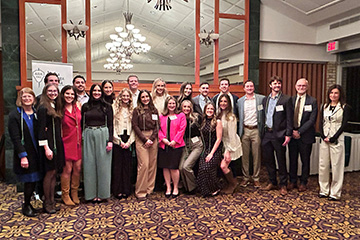Health care providers advance knowledge through simulation
CMU’s state-of-the-art simulation centers serve as a regional resource for medical professionals
The ultimate goal of all medical simulation is to improve patient care and patient outcomes. As part of its mission to train culturally competent physicians, the Central Michigan University College of Medicine oversees the Institute for Medical Simulation and maintains accredited facilities in Mt. Pleasant and Saginaw, including the Covenant HealthCare Simulation Center. They offer the most advanced technology including virtual reality simulation, high-fidelity manikins, clinical skills training, robotic surgery training, standardized patient and highly specialized scenarios.
The Simulation Centers are an excellent resource for medical professionals to hone and maintain their skills. They provide community access to important medical information and timely education in the rapidly expanding health care field. Throughout the 2023-24 Academic Year, the Simulation Center hosted a variety of events in collaboration with local and regional partners.
Simulation training is a safe and effective way to teach proper emergency response in a controlled environment. In cooperation with Emergency Medicine residents, the Sim Center has provided ultrasound-guided IV workshops for Covenant emergency medicine nurses and other CMU residents. As a participant in the Medical Student Forum at the Boyne Winter Symposium hosted by the Michigan College of Emergency Physicians, Sim Center staff ran a trauma exercise for medical students interested in emergency medicine. The Sim Center also collaborates with the American Board of Emergency Medicine to present the Haley Academy, a two-week mentorship program for medical students belonging to populations that are underrepresented in medicine. Through the Haley Academy, students visit the Sim Center to participate in three high-fidelity simulations, attend grand rounds and receive procedural training.
In addition to emergency response training, the Sim Center offered tracheostomy training to ten nurses and two physicians from HealthSource. In their session, the team from HealthSource practiced basic trach care and assessment as well as how to manage trach emergencies. Sim Center staff also partnered with the OB and NICU departments at Covenant to provide precipitous delivery education at Harbor Beach Hospital. This included teaching maneuvers for different types of deliveries, care for the mother, initial newborn assessment and neonatal resuscitation concepts.
The Sim Center has hosted events for several of the Student Special Interest Groups within the College of Medicine. As a regional resource, the Sim Center has welcomed the Pre-PA club from U of M Flint to participate in an airway workshop that included response scenarios for anaphylaxis and infant choking. The Kettering Pre-Med Club visits the Sim Center 3-4 times per year for a didactic session followed by a simulation exercise. They also learn procedural skills including IV placement, blood draws and intubation, giving them valuable experience in performing common medical procedures.




